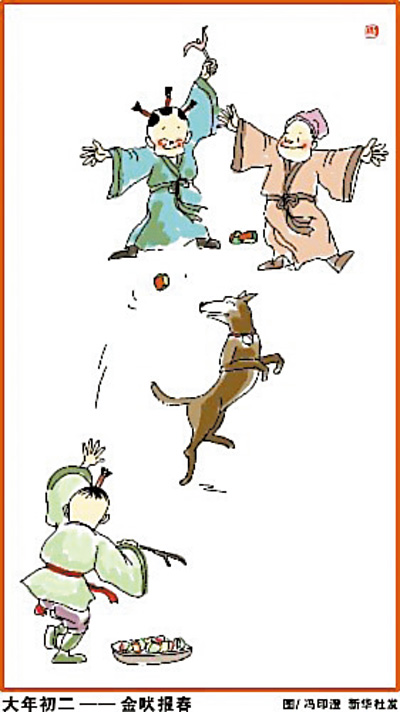
THE Spring Festival, which falls on the first day of the first lunar month, is the most important festival in China. Similar to Christmas in Western countries, this is a time for family reunions. Traditionally, celebrations start as early as a week before the big day and last until the middle of the first lunar month of the new year. With the lapse of time, some traditional customs are still followed today, but others have faded into history. With many people living in cities nowadays, many of the traditions have become impractical or unnecessary, but it doesn’t hurt to get a glimpse into how the Chinese people have lived in the past. Day 23 of the 12th month Little new year, which falls on the 23rd day of the 12th month in the lunar calendar, is also known as the Day of the Kitchen God, the deity who oversees the moral character of each household. People make sacrifices to the Kitchen God on this day. A picture of him is burnt dispatching the god’s spirit to heaven to report on the family’s conduct over the past year. The Kitchen God is then welcomed back by pasting a new picture of him beside the stove. Day 24 of the 12th month Families clean their home thoroughly on the 24th day of the 12th month in the lunar calendar, sweeping out the old stuff in preparation for the coming year. According to folklore, ghosts and deities must choose either to return to heaven or to stay on Earth during the last month of the year. It is believed that to ensure the ghosts and deities’ timely departure, people must thoroughly clean both their bodies and their dwellings, down to every last drawer and cupboard. Day 25 of the 12th month People turn the mill and make tofu on the 25th day of the 12th month in the lunar calendar, as legend says the Jade Emperor will descend to the human world and taste the residue left from making tofu to practice austerity. According to Taoist mythology, the Jade Emperor is the ruler of heaven and all realms of existence below, including that of man and hell. He is one of the most important gods in the Chinese religious pantheon. Day 26 of the 12th month The folk saying goes: “Butcher a pig and get meat prepared for the New Year feast” on the 26th day of the 12th month in the lunar calendar. In the old days, many people could not afford meat and they saved the best for the New Year feast. People’s livelihoods have improved greatly and meat is now a very common dish, but the Chinese still prefer having meat during the season. Day 27 of the 12th month People kill chickens and go to markets to buy groceries for the Spring Festival on the 27th day of the 12th month in the lunar calendar. People in different parts of China prepare many different ingredients and food for the New Year feast. Chicken is preferred in many places as well as fish, which has the Chinese pronunciation of “yu,” the same as another character meaning surplus. In Guangdong, people would also buy celery, pronounced “qin,” the same as another character meaning “diligence.” Day 28 of the 12th month After people have cleaned the house and started preparing food, they begin decorating their homes creating an atmosphere of joy and festivity on the 28th day of the 12th month in the lunar calendar. Decorations include spring couplets, New Year pictures, posters of door gods and paper cuts. A big “福” meaning “happiness” written on a piece of red square paper is also pasted on doors. Day 29 of the 12th month On the 29th day of the 12th lunar month, people visit the graves of their ancestors to honor their memory. It is said the Spring Festival originated in the Shang Dynasty (about 1600-1100 B.C.) as a ceremony sacrificing to gods and ancestors at the end of the old year and the start of a new one. Spring Festival Eve Chinese people are supposed to stay up the whole night on the last day of a lunar year. In Chinese mythology, a monster called “nian” would come out to harm people on this night, so people get together, staying up and chatting, hoping for a peaceful passage of the night. The custom of staying up (Chinese: 守太岁) is a gesture to be vigilant against all diseases and evil spirits, wishing good luck for the following year. Chinese people still attach great importance to the Spring Festival Eve today, when all family members eat dinner together. New Year’s Day The first day of the Chinese New Year officially begins at midnight. People used to set off firecrackers and make as much of a din as possible to chase off the evil monster nian. Most importantly the oldest and most senior members of a big family are visited to strengthen family ties. Senior members of the family hand out red envelopes containing cash (Chinese: 压岁钱), a form of blessing, to younger members of the family, mostly children and teenagers. However, in Guangdong Province, all grown-ups who remain single can still get red envelopes (Cantonese: 利是) from friends and relatives. All they have to do to get the lucky money is say “恭喜发财” (I wish you make a fortune). Day 2 of the 1st month On the second day of the lunar new year, a married daughter goes with her husband and children back to her original family to visit parents, relatives and close friends. Therefore, the day is called “meeting parents’ day.” In the past, married daughters didn’t have the opportunity to visit their birth families frequently. (To be continued on Thursday’s Page 15) (Chinadaily.com.cn) | 
